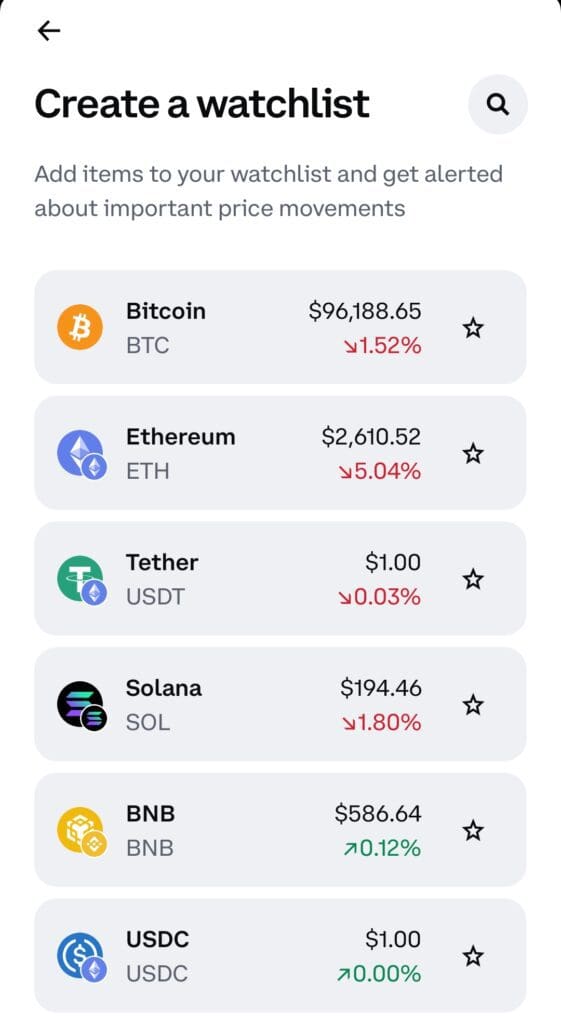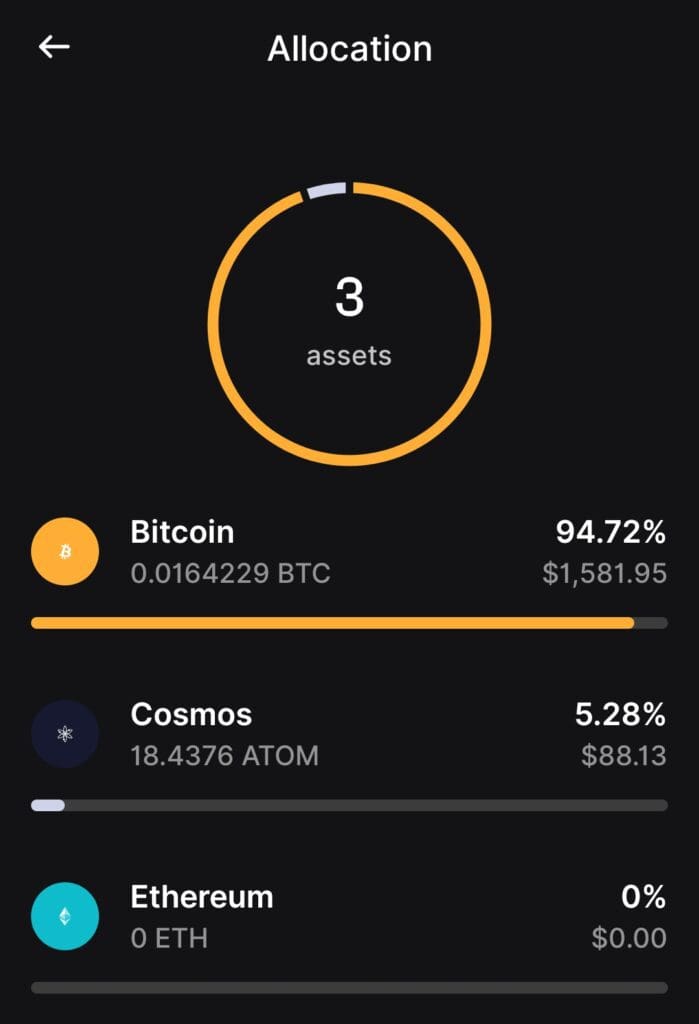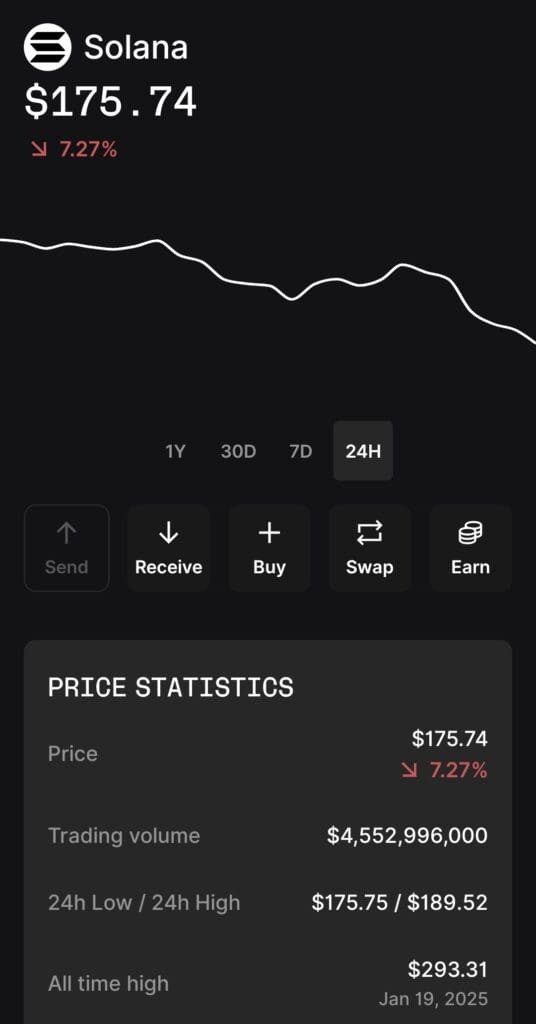Coinbase Wallet | Ledger Wallet | |
Wallet Type | Non-Custodial, Hot Wallet | Non-Custodial, Cold Wallet |
Supported Coins | +3,000 | +5,000 |
Swap Fee | 1% | About 0.25%
The Swap service is facilitated by third-party providers such as Changelly and ParaSwap, each with their own fee structures. For instance, Changelly charges a transaction fee of approximately 0.25%. |
Our Rating |
(4.4/5) |
(4.6/5) |
Read Review | Read Review |
Compare Wallet Features
When choosing a crypto wallet, it’s essential to understand the specific features that each option offers, as they vary in usability, supported cryptocurrencies, and security.
We’ll compare Coinbase Wallet and Ledger to help you make an informed decision, focusing on key aspects like ease of use, cryptocurrency support, and security features.
-
Ease of Use, Accessibility & Supported Cryptocurrencies
Coinbase Wallet offers a user-friendly experience with an intuitive interface, making it ideal for beginners.
Accessible through a mobile app or browser extension, it supports +3,000 cryptocurrencies, including Bitcoin (BTC), Ethereum (ETH), Dogecoin (DOGE), and ERC-20 tokens.
It also integrates seamlessly with the Coinbase exchange for easy asset transfers.

Ledger wallets, while a bit more complex, offer the highest security through cold storage, keeping your private keys offline.
The Ledger Live app allows access to +5,000 cryptocurrencies and integrates with third-party wallets for more asset management flexibility.
However, Ledger is not as accessible for beginners, as setup requires some technical knowledge.

-
Buy/Sell Cryptocurrencies
Coinbase Wallet lets users buy and sell crypto directly within the app using third-party payment providers like MoonPay. This makes purchasing assets quick and easy, especially for beginners.
However, buying crypto within the wallet may incur higher fees than purchasing through the Coinbase exchange.

Ledger does not directly support buying and selling within the app. Instead, users must purchase crypto through integrated third-party providers like Coinify.
While it doesn’t offer as seamless an experience for buying and selling, it does ensure your assets remain secure by keeping them in cold storage.

Overall, Coinbase Wallet simplifies buying and selling, while Ledger requires a more manual approach but offers superior security for assets once purchased.
-
Swap/Exchange Cryptocurrencies
Coinbase Wallet enables users to swap cryptocurrencies within the app.
This feature is convenient for trading assets, although it includes a 1% service fee for token exchanges, in addition to fees for the blockchain network.

Ledger Wallet doesn’t have built-in swap functionality. Instead, it connects with platforms like Changelly and Coinify for swapping.
While this offers more flexibility, the process may feel more disconnected compared to Coinbase Wallet’s in-app solution.

Overall, Coinbase Wallet offers a more seamless experience for swapping cryptocurrencies directly within the app, while Ledger’s third-party integrations add flexibility but require extra steps.
-
Staking Integration
Coinbase Wallet allows users to stake a variety of Proof-of-Stake (PoS) tokens, such as Ethereum (ETH), through decentralized applications (dApps) like Aave and Compound.
However, staking is self-directed, meaning users must manage their staking decisions and risks.

Ledger provides staking through the Ledger Live app for coins like Ethereum (ETH), Tezos (XTZ), and Cosmos (ATOM). The process is secure because your assets remain in cold storage, making it a great option for long-term staking.

Overall, both wallets offer staking, but Ledger’s cold storage provides an added layer of security, while Coinbase Wallet gives users more flexibility with decentralized finance (DeFi) dApp integrations.
-
Security and Privacy Features
Coinbase Wallet prioritizes security with encryption of private keys on your device.
While it lacks two-factor authentication (2FA) and multi-signature support, it does offer biometric security on mobile devices. The wallet is also non-custodial, meaning you retain full control over your crypto.

Ledger stands out for its industry-leading security, utilizing cold storage to keep private keys offline.
It offers multi-signature authentication and optional two-factor authentication (2FA) for added protection. Ledger also uses a Secure Element chip to prevent unauthorized access to your funds.

-
NFT Support and DeFi Integration
Coinbase Wallet supports Ethereum-based NFTs, allowing users to store, buy, and sell NFTs directly from the wallet. It seamlessly integrates with decentralized applications (dApps) like OpenSea for easy NFT trading.
Additionally, Coinbase Wallet offers robust DeFi access, connecting with platforms like Uniswap and Aave for lending, staking, and yield farming.

Ledger also supports NFT management through the Ledger Live app for Ethereum and Polygon-based NFTs.
While it lacks native marketplace integrations, users can access NFT platforms like OpenSea through third-party wallet integrations.
Ledger’s DeFi access is secure via third-party platforms like MetaMask, providing flexible DeFi and staking options.

-
Backup, Recovery, and Multi-Signature Support
Coinbase Wallet provides a 12-word recovery phrase for backup, allowing users to restore access if the wallet is lost.
However, it lacks multi-signature support, which could enhance security by requiring multiple approvals for transactions. The recovery process is straightforward, making it easy for users to regain access in case of device loss.
Ledger excels in backup, recovery, and multi-signature support, offering enhanced security features that Coinbase Wallet lacks, making it a better option for security-conscious users.
Ledger wallets come with a 24-word recovery phrase, offering an extra layer of security compared to Coinbase Wallet. In addition, Ledger supports multi-signature authentication, which requires multiple approvals for transactions, significantly reducing the risk of unauthorized transfers.
Which Investors May Prefer Coinbase Wallet?
Coinbase Wallet is ideal for beginners and casual investors looking for ease of use and seamless access to crypto and DeFi.
Beginner-Friendly Interface: Its intuitive design is perfect for those new to crypto.
Access to DeFi & NFTs: Easily connect with dApps and engage in NFT trading and staking.
Seamless Integration with Coinbase Exchange: Simplifies fund transfers between wallet and exchange accounts.
Free to Use: No fees for wallet setup or receiving crypto, though transaction-related fees apply.
Which Investors May Prefer Ledger Wallet?
Ledger Wallet is perfect for experienced investors who prioritize the highest security for their crypto holdings and long-term storage.
Top-Tier Security: Cold storage ensures your assets are offline and safe from hackers.
Multi-Signature & 2FA: Provides an extra layer of protection for crypto transactions.
Wide Crypto & NFT Support: Supports over 5,500 cryptocurrencies and Ethereum-based NFTs.
Advanced Staking Features: Securely stake assets while keeping them in cold storage.
Bottom Line
Coinbase Wallet excels in ease of use, making it perfect for beginners and casual investors. It offers access to DeFi and NFTs with simple functionality.
In contrast, Ledger Wallet provides top-notch security for long-term crypto storage, ideal for experienced investors who prioritize cold storage, multi-signature, and advanced features like staking.
